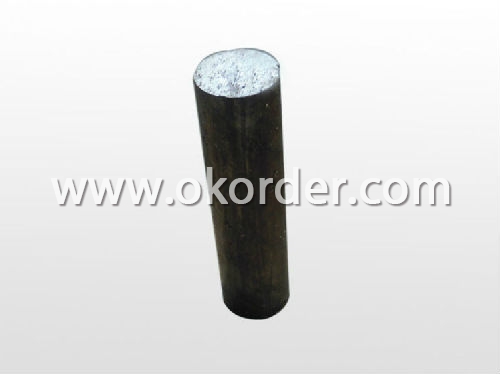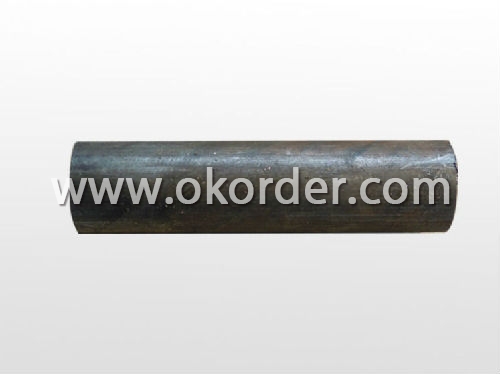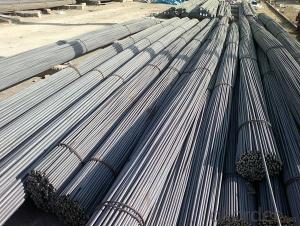Hot Rolled Steel Round Bar for Structure Using
- Loading Port:
- Tianjin
- Payment Terms:
- TT or LC
- Min Order Qty:
- 25 m.t.
- Supply Capability:
- 200000 m.t./month
OKorder Service Pledge
OKorder Financial Service
You Might Also Like
Product Description:
OKorder is offering Hot Rolled Steel Round Bar for Structure Using at great prices with worldwide shipping. Our supplier is a world-class manufacturer of steel, with our products utilized the world over. OKorder annually supplies products to European, North American and Asian markets. We provide quotations within 24 hours of receiving an inquiry and guarantee competitive prices.
Product Applications:
Hot Rolled Steel Round Bar for Structure Using are ideal for structural applications and are widely used in the construction of buildings and bridges, and the manufacturing, petrochemical, and transportation industries. Carbon steel round bar is the most common form of steel because its price is relatively low while it provides material properties that are acceptable for many applications, more so than iron. It is often used when large quantities of steel are needed, for example as structural steel. The density of this product is approximately 7.85g/cm³ and the young's modulus, like all steels.
Product Advantages:
OKorder's Steel I-Beams are durable, strong, and resist corrosion.
Main Product Features:
· Premium quality
· Prompt delivery & seaworthy packing (30 days after receiving deposit)
· Corrosion resistance
· Can be recycled and reused
· Mill test certification
· Professional Service
· Competitive pricing
Specifications of Hot Rolled Steel Round Bar for Structure Using
1. Grade: Q235, SS400, S235JR, A36
2. Sizes: Diameter: 6mm-150mm; Length: 6m, 9m, 12m or as customer’s request
3. Type: Mild steel; Low carbon steel
4. Shape: Round bar, solid bar of steel with circular section
5. Technique: Hot rolled or cold drawn
6. Mass: Mass(kg/m) = Diameter(mm)×Diameter(mm)×0.00617
Steel Type | Maximum forging temperature (°F / °C) | Burning temperature (°F / °C) |
1.5% carbon | 1920 / 1049 | 2080 / 1138 |
1.1% carbon | 1980 / 1082 | 2140 / 1171 |
0.9% carbon | 2050 / 1121 | 2230 / 1221 |
0.5% carbon | 2280 / 1249 | 2460 / 1349 |
0.2% carbon | 2410 / 1321 | 2680 / 1471 |
3.0% nickel steel | 2280 / 1249 | 2500 / 1371 |
3.0% nickel–chromium steel | 2280 / 1249 | 2500 / 1371 |
5.0% nickel (case-hardening) steel | 2320 / 1271 | 2640 / 1449 |
Packaging & Delivery of Hot Rolled Steel Round Bar for Structure Using
Packaging Detail: All goods are packed in bundle with steel strips and shipped by break bulk vessel or container (depend on target market and different ports)
Delivery Detail: 45 days
Trade terms: FOB, CFR, CIF
MOQ: 25 tons per specification; we can negotiate the quantity if the specification is normal or we have stock of one specification.
Weight: The price invoicing on theoretical weight basis or actual weight basis depends on customer’s request.
Shipment: The shipment of bulk break or container is depends on customer’s request and the situation of the port of destination.
Documents given: Full set of original clean on board bill of lading; Original signed commercial invoice; Original packing list; Policy of insurance; Certificate of origin and what the target market needs.
Production Flow of Carbon Steel Round Bar
1. The common processes are preheated forging quenching, dual refinement solution process, cooling quenching and isothermal quenching. We use heat treatment for dual refinement solution process. The main measures process is high temperature solution and refinement cycle. High temperature solution can improve the carbide morphology and particle size. The aim is to make the loop refinement ultrafine austenite grains.
2. EAF+LF+VD+ Forged+ Heat Treatment


FAQ:
Q1: Can fit in the containers of 20fts the steel beams of 6M?
A1: No proble, we can put them into the containers in the form sideling.
Q2: What is the normal tolerance of Hot Rolled Mild Steel Angle Beams for Structures and for Buildings?
A2: Normally 3%-5%, but we can also produce the goods according to the customers' requests.
Q3: The products are invoicing on theoritical weight or on actual weight?
A3: We can do it in both manners, according to the customers' request.
- Q:45# what are the main rounds for?
- High quality carbon structural steel can be used in many and many structural steels. It is widely used and can be used as long as it does not involve corrosion, or too high strength and toughness
- Q:How are steel round bars used in the construction of pipelines?
- Steel round bars are commonly used in the construction of pipelines as they provide strength and durability to withstand the high pressure and external forces exerted on the pipelines. These bars are often used as reinforcement within the pipeline structure, ensuring its stability and preventing deformation or collapse. Additionally, steel round bars are employed for welding purposes, connecting different sections of the pipeline together, further enhancing its structural integrity.
- Q:What is hot rolling? What is called forging?
- Hot rolling is the rolling process at which the temperature is above the recrystallization temperature, so that the finished product is better than cold rolling
- Q:What is the maximum phosphorus content allowed for steel round bars?
- The allowed phosphorus content in steel round bars is determined by the specific steel grade and industry standards, which can vary. Generally, the phosphorus content in steel round bars is typically limited to a maximum range of 0.04% to 0.05%. This limitation is necessary to maintain the desired mechanical properties, including strength, toughness, and ductility, of the steel product. Exceeding this phosphorus content can have negative consequences, such as reduced weldability, increased brittleness, and decreased corrosion resistance. To ensure the quality and performance of steel round bars in different applications, manufacturers and regulatory bodies establish stringent limits on phosphorus content. It is essential to refer to the relevant industry standards or specifications to determine the specific maximum phosphorus content permitted for a particular steel grade or application.
- Q:What is the mechanical properties of No. 40 round bar?
- There are 20 kinds of steel classification: carbon steel, alloy steel, carbon structural steel, special purpose and so on. Look at the questions this afternoon and find out about the books. Which type of steel do you ask? This is not clear, I gave up the answer, and then I see your this question.
- Q:What are the advantages of using maraging steel round bars?
- Using maraging steel round bars in various applications offers several benefits. Firstly, these bars possess an impressive strength-to-weight ratio, making them ideal for situations where strength is crucial. They can withstand high stress and load-bearing conditions without deforming or failing, ensuring structural integrity. Secondly, maraging steel round bars exhibit exceptional toughness, enabling them to absorb significant amounts of energy before fracturing. This toughness makes them highly resistant to cracking or breaking, even under extreme conditions, enhancing their durability and reliability. Additionally, maraging steel round bars are known for their outstanding corrosion resistance. Unlike other types of steel, they are less prone to rust and oxidation, making them suitable for use in harsh environments or where exposure to moisture or chemicals is a concern. This corrosion resistance helps extend the lifespan of the bars and reduces maintenance costs. Furthermore, maraging steel round bars are relatively easy to machine, despite their high strength and hardness. They can be easily shaped, drilled, and cut into different forms and sizes, allowing for versatile applications across various industries. This ease of machining saves time and effort during the manufacturing process. Moreover, maraging steel round bars have excellent heat treatability, meaning they can be hardened and tempered to further enhance their mechanical properties. This flexibility in heat treatment allows for customization to meet specific project requirements, such as achieving desired hardness levels or improving characteristics like wear resistance or toughness. Lastly, maraging steel round bars are widely used in the aerospace and defense industries due to their exceptional strength, toughness, and corrosion resistance. They are commonly utilized in the manufacturing of critical components such as landing gear, missile casings, and aircraft structures, where reliability and performance are paramount. In conclusion, the advantages of using maraging steel round bars include high strength, superior toughness, corrosion resistance, machinability, heat treatability, and suitability for aerospace and defense applications. These properties make them the preferred choice for demanding industries, ensuring optimal performance and longevity in critical applications.
- Q:Are steel round bars suitable for the production of fasteners?
- Fasteners can be produced using steel round bars, which are a suitable choice. Steel is known for its strength and durability, enabling it to withstand high levels of tension and pressure. This makes it an ideal option for fasteners. Round bars, specifically, offer a smooth and even surface that can be easily machined and shaped into various types of fasteners like bolts, screws, and studs. The versatility of steel round bars allows for customization in terms of size, length, and surface finish. As a result, they are suitable for a wide range of fastening applications in industries such as construction, automotive, and manufacturing. Moreover, steel round bars exhibit excellent corrosion resistance properties when coated with protective finishes. This ensures that the fasteners have a long lifespan and can be relied upon.
- Q:What is the difference between a polished and a hot rolled steel round bar?
- The manufacturing processes and resulting surface finishes distinguish polished steel round bars from hot rolled ones. To produce hot rolled steel round bars, a steel billet or ingot is heated to high temperatures and then shaped into a round bar through rolling. This method yields a surface finish that is rough and uneven, with mill scale and imperfections. Hot rolled bars are typically utilized in applications where surface finish is not crucial, such as structural components, machinery parts, and construction materials. In contrast, polished steel round bars undergo additional steps to achieve a smooth and glossy surface finish. Following the hot rolling process, these bars undergo various grinding and polishing techniques to eliminate mill scale, surface imperfections, and achieve a consistent finish. The result is a refined and visually appealing surface, suitable for applications where appearance matters, such as decorative items, furniture, and architectural components. Aside from surface finish, the mechanical properties of the two types of steel round bars can also differ. Hot rolled bars tend to possess a rougher surface and may exhibit residual stresses, while polished bars feature a smoother surface and reduced internal stresses. However, the overall mechanical properties, including strength and hardness, are predominantly determined by the grade and composition of the steel used, rather than the manufacturing process or surface finish. In conclusion, the discrepancy between polished and hot rolled steel round bars lies in their surface finish. Hot rolled bars have a rough and uneven surface with mill scale and imperfections, while polished bars undergo further processing for a smooth and glossy finish. The choice between the two depends on the specific application and desired appearance of the final product.
- Q:What are the advantages of using phosphorus-alloy steel round bars?
- There are several advantages of using phosphorus-alloy steel round bars: 1. Increased strength: Phosphorus-alloy steel round bars have a higher tensile strength compared to standard steel bars. This increased strength makes them suitable for applications that require greater load-bearing capacity, such as construction and automotive industries. 2. Enhanced corrosion resistance: Phosphorus-alloy steel has a higher resistance to corrosion compared to regular steel. This makes it more durable and long-lasting, especially in environments with high moisture or exposure to chemicals. 3. Improved machinability: Phosphorus-alloy steel has excellent machinability, which means it can be easily shaped, cut, and formed into various designs or structures. This characteristic makes it a preferred choice for industries that require precise shaping, such as manufacturing and engineering. 4. Reduced brittleness: Phosphorus-alloy steel has a lower brittleness factor compared to other types of steel. This means it is less likely to break or fracture under sudden impact or stress, making it a safer option for applications where structural integrity is crucial. 5. Cost-effective: Despite its enhanced properties, phosphorus-alloy steel round bars are still cost-effective compared to other specialty alloys. This makes them a more affordable choice for industries that require high-performance materials without breaking the budget. 6. Improved weldability: Phosphorus-alloy steel round bars have excellent weldability, allowing for easy and secure welding connections. This characteristic makes them suitable for applications that require strong and reliable welded joints, such as construction or fabrication projects. In summary, phosphorus-alloy steel round bars offer increased strength, enhanced corrosion resistance, improved machinability, reduced brittleness, cost-effectiveness, and improved weldability. These advantages make them a preferred choice for various industries where high-performance materials are required.
- Q:What are the different types of steel round bar alloys used in the marine industry?
- Some of the different types of steel round bar alloys used in the marine industry include stainless steel, carbon steel, alloy steel, and duplex steel. These alloys are chosen for their corrosion resistance, strength, and durability in harsh marine environments.
1. Manufacturer Overview |
|
|---|---|
| Location | |
| Year Established | |
| Annual Output Value | |
| Main Markets | |
| Company Certifications | |
2. Manufacturer Certificates |
|
|---|---|
| a) Certification Name | |
| Range | |
| Reference | |
| Validity Period | |
3. Manufacturer Capability |
|
|---|---|
| a)Trade Capacity | |
| Nearest Port | |
| Export Percentage | |
| No.of Employees in Trade Department | |
| Language Spoken: | |
| b)Factory Information | |
| Factory Size: | |
| No. of Production Lines | |
| Contract Manufacturing | |
| Product Price Range | |
Send your message to us
Hot Rolled Steel Round Bar for Structure Using
- Loading Port:
- Tianjin
- Payment Terms:
- TT or LC
- Min Order Qty:
- 25 m.t.
- Supply Capability:
- 200000 m.t./month
OKorder Service Pledge
OKorder Financial Service
Similar products
New products
Hot products
Related keywords































